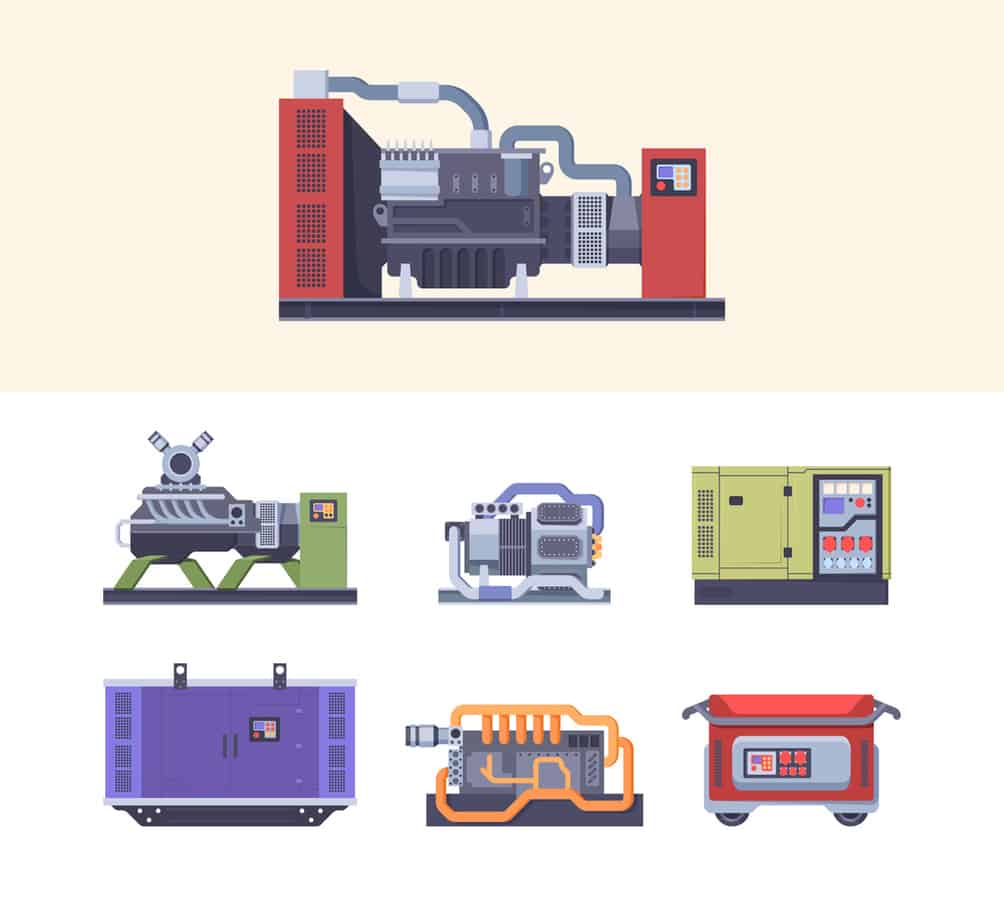:
Choosing between gas and diesel fuel can significantly impact performance and long-term costs when selecting a portable generator. Understanding the critical differences between these power solutions helps ensure you make the right choice for your specific needs. This comprehensive comparison explores the crucial factors that influence generator selection and performance.
Fuel Efficiency and Performance
Diesel generators consistently demonstrate superior fuel efficiency compared to their gasoline counterparts. The compression ignition system used in diesel engines creates more energy per gallon of fuel, resulting in longer runtime and better overall performance. While proper generator maintenance is essential for both types, diesel engines typically deliver more consistent power output over extended periods.
Diesel fuel’s higher energy density means diesel generators can run longer between refueling sessions. However, gasoline generators offer the advantage of readily available fuel, making them particularly attractive for emergency backup situations. Understanding DuroMax generator fuel efficiency tips and similar optimization strategies can help maximize performance regardless of fuel type.
Modern diesel engines have also made significant strides in power delivery and reliability. Their robust design and higher compression ratios contribute to better performance under heavy loads, making them ideal for demanding applications. While slightly less efficient, gasoline generators offer excellent performance for intermittent use and more minor power needs.
Cost Considerations
The financial aspect of generator ownership extends beyond the initial purchase price. While diesel generators typically command a higher upfront cost, their superior fuel efficiency and longer lifespan often result in better long-term value. Understanding generator wattage and sizing is crucial for making a cost-effective choice that meets your power needs without overbuying capacity.
Operating costs vary significantly between the two types, with diesel units generally showing advantages in long-term maintenance expenses. The more robust construction of diesel engines typically results in fewer repairs over the generator’s lifetime. However, when repairs are needed, they often cost more than similar repairs on gasoline units. Fuel price fluctuations can significantly impact operating costs, making it essential to consider local fuel availability and pricing trends in your decision.
Maintenance Requirements
Diesel generators boast more straightforward maintenance requirements due to their lack of spark plugs and carburetors. This design advantage results in fewer components that can fail and less frequent service intervals. Diesel engines’ robust construction means they can often run for thousands of hours before requiring major service, provided regular maintenance schedules are followed.
While gasoline generators require more frequent maintenance, they typically involve simpler procedures that many owners can perform themselves. Reliability becomes crucial when powering your home during a blackout, making proper maintenance essential regardless of fuel type. Regular oil changes, filter replacements, and fuel system maintenance help ensure both types of generators remain ready for service when needed.
Environmental Impact
Modern generator design has significantly reduced the environmental impact of both fuel types. While diesel engines historically produced more visible emissions, newer models incorporating eco-friendly portable power technologies have dramatically improved their environmental performance. Manufacturers now focus on reducing emissions while maintaining or improving efficiency.
The comparison between propane and gas generators often enters this discussion, as alternative fuels become increasingly popular for their reduced environmental impact. Modern diesel generators must meet strict Tier 4 emissions standards, and they are significantly cleaner than their predecessors. Additionally, advances in fuel injection technology and engine management systems have helped reduce the environmental footprint of both gas and diesel generators.
Practical Considerations
Generator noise levels vary significantly between models and fuel types. While diesel generators traditionally produced more noise, modern designs have narrowed this gap considerably. Manufacturers now employ advanced sound-dampening technologies, improved exhaust systems, and innovative enclosure designs to reduce operational noise regardless of fuel type.
Portability and installation requirements represent important practical considerations. Diesel generators typically weigh more due to their heavier-duty construction and larger fuel tanks. This additional weight can affect mobility and installation options. Gasoline generators generally offer greater portability, making them more suitable for applications requiring frequent relocation. Installation location must account for fuel storage, ventilation requirements, and accessibility for maintenance.
Applications and Best Uses
Different applications demand different generator characteristics. Diesel generators excel in scenarios requiring continuous operation, such as construction sites, emergency facilities, and industrial applications. Their durability and efficiency make them ideal for situations where reliable, long-term power is essential. The ability to run for extended periods without refueling provides an additional advantage in remote locations or during prolonged power outages.
Gasoline generators better serve intermittent use scenarios, such as residential backup power, recreational activities, and temporary work sites. Their lower initial cost and simpler maintenance requirements make them attractive for occasional use. The widespread availability of gasoline also makes them practical for emergency preparedness, though fuel storage considerations become important for extended outages.
Conclusion
The choice between gas and diesel ultimately depends on your specific needs, budget, and intended use. Consider factors like fuel availability, maintenance capabilities, and power requirements when making your decision. Regular maintenance and proper sizing ensure optimal performance regardless of fuel type. By carefully evaluating these factors and understanding your power needs, you can select the generator type that best serves your requirements while providing reliable, efficient power when you need it most.

Leave a Reply